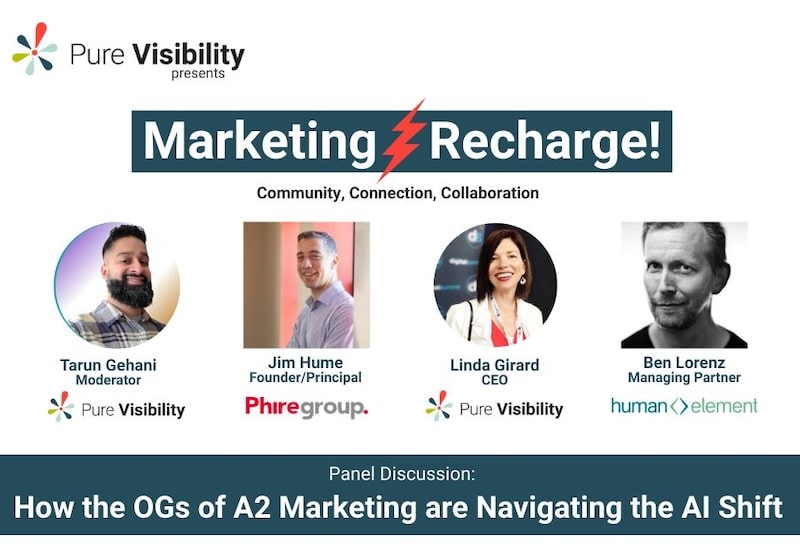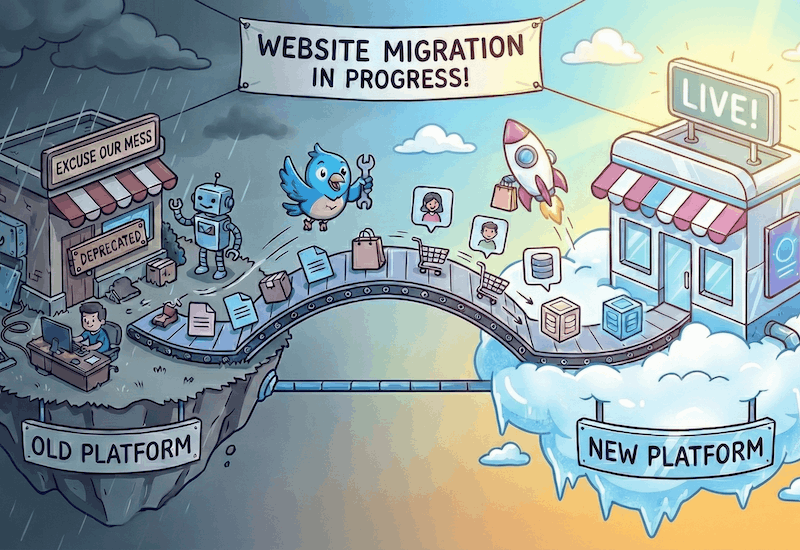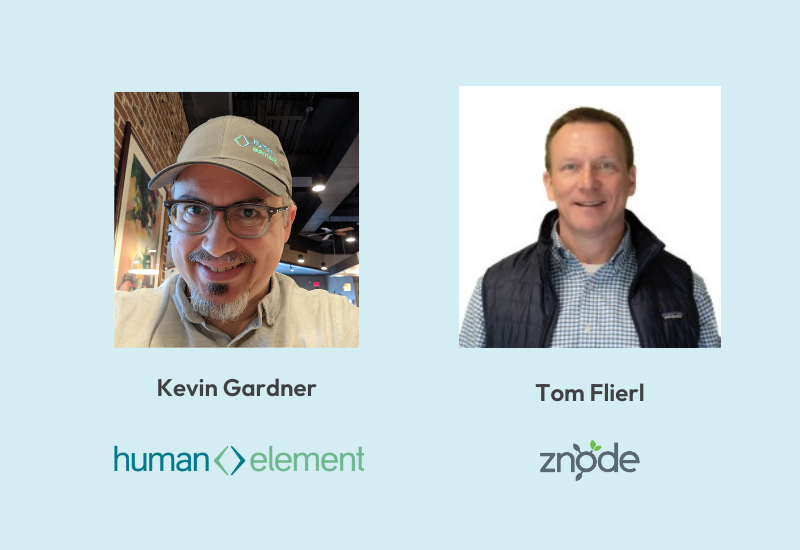If you’ve felt like AI went from science fiction to daily reality in the blink of an eye—you’re not alone. At a recent panel discussion hosted by Pure Visibility at Bamboo Ann Arbor, three Michigan-based business leaders came together to explore how AI is transforming marketing, business operations, and the creative process. What unfolded was a candid, energizing conversation about how AI is reshaping not only tools and tactics, but business models, talent, and what it means to think creatively.
The event featured:
- Ben Lorenz, Managing Partner at Human Element, an eCommerce development agency known for complex, tech-forward solutions for clients like Ford, Watsco, and Shinola.
- Jim Hume, Founder of Phire Group, a brand and culture agency celebrated for blending research and storytelling for clients like Two Men and a Truck, Cabinetworks, UMS, and the University of Michigan Museum of Art.
- Linda Girard, CEO and Co-Founder of Pure Visibility, a digital marketing agency helping brands grow online since 2005, with clients like Caliber Collision, Nustep, and Oxford Companies.
The Spark: First Encounters With AI
The panel began with a look back: where did each speaker first encounter AI? For Ben, it was during his early days at Fry in Ann Arbor in the late ’90s. His team had a radical idea—pool data from eCommerce sites to surface insights. It wasn’t called AI yet, but they used what we’d now consider machine learning to automate reporting and detect patterns across vast data sets.
Jim drew laughter with a Monty Python reference, likening AI’s rise to a knight charging from far away—seemingly distant, then suddenly upon us. That analogy stuck: we’d seen the hints—predictive analytics, recommendation engines—but the past 18 months have delivered an “aha” moment for many. AI’s not on the horizon anymore—it’s in our inboxes, workflows, and creative processes.
For Linda, the real shift came in late 2022 with the launch of ChatGPT. She felt an intuitive urgency to act, gathering her team to brainstorm how they could experiment and integrate AI into their daily work. “I’ve never been this excited,” she said. “This is it. This is the moment.”
AI in Real Life: Use Cases from the Panel and the Crowd
One of the most engaging portions of the evening came when the panel and audience shared unusual and innovative ways they’ve been using AI.
- Writing business plans in seconds: Ben described generating a detailed business case—including budget, roles, and schedule—for a student jazz mentorship program using ChatGPT in under a minute. The plan is now being implemented by real students in Ann Arbor.
- Fashion advice: Linda used AI to generate outfit ideas for themed parties by giving her measurements and preferred styles, and received links to recommended apparel to purchase.
- AI as a creative partner: Jim used ChatGPT to role-play as a tough audience member, helping him prepare for the very panel discussion he was on. It’s a basic use on the surface—but a powerful method for internalizing messaging and testing delivery.
- Creative coaching with AI clones and dog metaphors: One audience member asked ChatGPT what her dogs would look like as humans. Another was experimenting with HeyGen to clone her voice and likeness for virtual coaching—an idea both fascinating and slightly uncanny.
These use cases were fun, but the larger point wasn’t lost: AI isn’t just a productivity booster—it’s a new layer of creativity, experimentation, and insight.
AI as Amplifier, Not Replacement
Each speaker made it clear: AI is a tool—powerful, yes, but still only as effective as the person using it.
“Repetition is dead,” said Ben. “If you’re doing the same digital task every day, AI will replace it.” The key, then, is not to fear AI, but to ask: What does this free me up to do?
Jim added that at Phire Group, they’re restructuring teams around common problems rather than fixed roles. Instead of hiring for specific technical skills, they’re prioritizing curiosity, adaptability, and a growth mindset—qualities that can’t be automated.
Linda agreed, noting that AI has opened up time in her week to read books, think strategically, and help her team push boundaries. It’s not about doing more faster—it’s about doing better, more meaningful work.
Guardrails, Privacy, and Ethical Use
The panel also addressed a very real concern in the room: how do we protect data and ensure ethical AI use?
Ben shared how Human Element adopted a private ChatGPT environment with internal governance rules. Some clients, like Caterpillar, prohibit the use of their data in public AI tools—so having a siloed, controlled workspace for AI is key. He also noted they’ve added AI-specific language to their master service agreements to protect both their clients and themselves.
Linda added that she doesn’t use free versions of AI tools for business purposes—she pays for privacy and control. Everyone agreed that governance policies and legal counsel are now non-negotiables for organizations exploring AI seriously.
Changing the Nature of Marketing Services
One of the most important threads throughout the evening was how AI is changing agency offerings and the services marketers provide.
Jim put it bluntly: “Will websites still be a thing in three years?” Maybe—but they may not look or function like today’s. With AI agents able to handle tasks like booking vacations or answering questions, consumers are shifting from browsing to asking.
Linda explained how they’re already using ChatGPT to test and refine their own content strategy—asking it how their services stack up, what categories to highlight, and how it might rank results. It’s not about tricking the algorithm; it’s about understanding how these systems evaluate relevance and authority.
Panelists agreed: in this new landscape, marketers must shift from deliverables to systems thinking. How can you help a client anticipate needs, visualize outcomes, or become the first brand their AI assistant recommends?
What’s Coming Next—and Who Will Lead?
The final part of the discussion explored how leadership and talent development are changing in the AI era.
Ben encouraged companies to train employees to see themselves as visionaries, not task-runners. Repetitive jobs will fade, but people who can think across domains, combine data sources, and see around corners will thrive.
Jim added that the value of authenticity and creativity is rising. In a world of perfect automation, human imperfections and ideas become even more powerful. “There’s still a desire for vinyl records,” he said, drawing a parallel to how audiences crave connection, even in a digital age.
The session ended on a hopeful, energetic note: we’re at the beginning of a major shift, but it’s still early. For those willing to experiment, collaborate, and ask bigger questions, the future is full of opportunity.
Final Takeaways
- AI is here, but it’s still early—which means now is the time to play, test, and learn.
- Repetitive work is going away. Strategic, creative, visionary work is in demand.
- Human insight still matters. AI is a tool, not a substitute for values, ethics, or vision.
- Organizational policy matters. Build guardrails now, not later.
- Your value isn’t what you produce, but how you think—and how you use tools to turn ideas into outcomes.
Want More?
- Attend AI workshops and SEO office hours with local experts.
- Start your own experiment: Pick one AI tool, give it a real task, and see what you learn.
- Talk to your team: What could be automated? What could be amplified?
- Join future Pure Visibility marketing sessions: Held every fourth Tuesday of the month at Bamboo Ann Arbor.
We’ll leave you with this question, posed by one attendee: “What do I need to be learning today to make sure I don’t miss the wave?”



